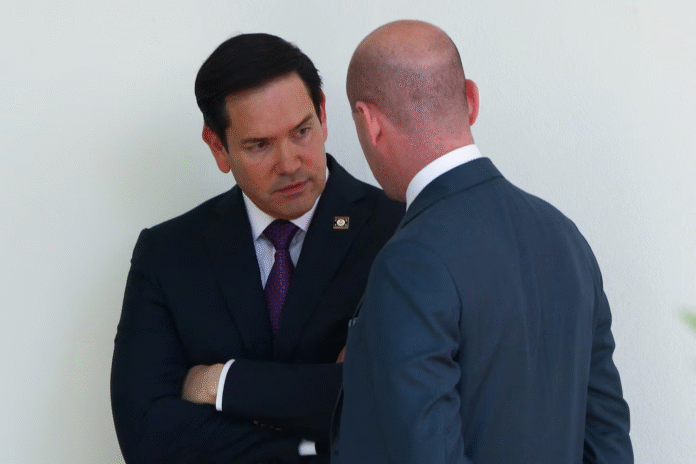
In the first major Cabinet shift of his second term, President Donald Trump has announced a significant change to his national security leadership. Former National Security Adviser Mike Waltz will leave his current role and has been nominated to serve as the United States Ambassador to the United Nations. In the interim, Secretary of State Marco Rubio will take on the added responsibility of national security adviser, continuing in his current diplomatic post as well.
This reshuffle follows weeks of mounting pressure surrounding Waltz’s controversial use of the encrypted messaging app Signal during sensitive policy discussions, including conversations about a U.S. military operation in Yemen. While the White House has tried to project a sense of continuity and confidence, it is clear that the incident — and its fallout — have reshaped internal dynamics within the Trump administration.
The Announcement and Its Framing
President Trump made the personnel announcement through his favored conservative social media platform, praising Waltz for his service and expressing confidence in his future role at the United Nations. “From his time in uniform on the battlefield, in Congress and as my National Security Advisor, Mike Waltz has worked hard to put our Nation’s Interests first,” Trump wrote. “I know he will do the same in his new role.”
In the same post, Trump confirmed that Secretary of State Marco Rubio will serve as acting national security adviser, applauding his “strong leadership” and adding, “Together, we will continue to fight tirelessly to Make America, and the World, SAFE AGAIN.”
Rubio’s new dual role reflects both the president’s trust in him and the urgency of maintaining stability amid internal controversy and global uncertainty.
Fallout from the Signal App Controversy
The cabinet reshuffling comes after Waltz was embroiled in a communications scandal that made headlines and stirred bipartisan concern. In March, Waltz accidentally added journalist Jeffrey Goldberg from The Atlantic to a Signal group chat that included high-level discussions about a military strike against Houthi rebels in Yemen. The chat involved top officials, including Defense Secretary Pete Hegseth and Vice President JD Vance.
Though no classified details were confirmed to have been shared, the blunder raised serious questions about the administration’s digital security protocols and Waltz’s judgment. The incident became a lightning rod in Washington, with critics calling for greater accountability and scrutiny of how secure communications are managed at the highest levels of government.
While Trump initially downplayed the episode, referring to it as a “lesson learned” by a “good man,” sources close to the matter say the president grew increasingly impatient with the distraction. Ultimately, the decision to reassign Waltz was framed as a strategic pivot rather than a disciplinary action.
Vice President Vance reinforced this narrative during a Thursday interview, saying that Waltz had completed “serious reforms” within the National Security Council and would now serve the administration better at the U.N. “If the president wanted to fire him over the Signal thing, he would’ve just done it,” Vance said, dismissing the controversy as a “nothingburger.”
Rubio’s Surprising but Strategic Appointment
News of Rubio’s temporary elevation to national security adviser came as a surprise — even to some within the administration. At the time of Trump’s post, State Department spokesperson Tammy Bruce was mid-press briefing and admitted she had just learned of the change. Still, she praised Rubio as a versatile leader who has “worn several hats from day one” and is closely aligned with the president’s strategic vision.
Rubio was seen speaking with senior White House staff, including deputy chief of staff Stephen Miller, shortly before the announcement. His presence and influence within the administration have grown steadily, and this new dual assignment may further solidify his position as one of the most powerful voices in Trump’s foreign policy apparatus.
However, questions remain about the feasibility of holding both roles simultaneously, especially amid ongoing international tensions and domestic political scrutiny.
A Calm Exit for Waltz — For Now
Despite the scandal, Waltz’s departure has been portrayed as orderly and honorable. He was still participating in high-level engagements as recently as Wednesday’s Cabinet meeting, where he publicly praised the president’s leadership during the first 100 days of the second term. On Thursday morning, he was seen conducting a Fox News interview at the White House but did not attend the National Day of Prayer event later that day.
Waltz responded to the president’s nomination on social media, writing, “I’m deeply honored to continue my service to President Trump and our great nation.” While his new role as UN ambassador will require Senate confirmation, the hearings may expose him to further scrutiny over the Signal affair and test the administration’s narrative about its significance.
Meanwhile, Defense Secretary Pete Hegseth, also implicated in the Signal controversy for allegedly sharing operational details with family members, appears to remain secure in his position. Trump recently told The Atlantic that Hegseth was “safe,” while joking that “maybe don’t use Signal, okay?”—a tacit acknowledgment that the episode had rattled confidence even within the president’s inner circle.
Political Implications and What Comes Next
Though the administration has done its best to present the reshuffle as a routine personnel decision, the underlying cause remains a clear cautionary tale about technology, transparency, and responsibility at the highest levels of national security.
Rubio’s ability to juggle two of the most consequential roles in U.S. foreign policy will be tested immediately. Meanwhile, Waltz’s confirmation process will be closely watched as a litmus test for how much political fallout the administration is willing to absorb from its handling of the Signal affair.
As the dust settles, the broader lesson may lie in Trump’s own parting words on the matter: “If you want to know the truth… I wouldn’t want to use [Signal].” That kind of hindsight may not undo the damage, but it underscores how even the most advanced tools can become liabilities in the wrong hands—or under the wrong circumstances.


